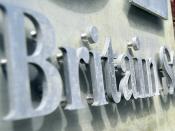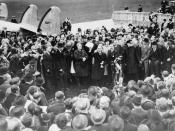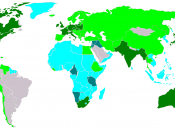At the end of the 1920s there seemed to have been a positive step forward in peaceful relations between Germany and Britain after the antagonistic peace brought about by the Versailles peace treaty. The Locarno "honeymoon" had created a feeling of goodwill among the general population at least in Britain. Yet behind the closed doors of the negotiating table leaders/diplomats must have been aware of the limitations of the existing peace and friendly 'spirit'.
There was disagreement between France, America and Britain in diplomatic attitude to Germany: France believing Versailles was the end of peace making, Britain the beginning with the US abstaining from anything to do with Versailles. This would have a serious bearing on Anglo-German diplomacy and is key to the success (or comparative failure) of diplomacy in the period.
One of the greatest problems facing Anglo-German diplomacy was that of reparations, a legacy from Versailles. This flared up in 1923 when Germany fell hopelessly behind in its payments and France tried to extract the bill by occupying the industrial Rhur area.
Britain adopted a policy of 'surely neutrality' on the issue, (the first signs of the now unpopular Appeasement policy pursued by Britain throughout the inter-war period). German passive resistance led to economic inflation and industrial stagnation. This stalemate was 'resolved' by the Dawes plan (partially negotiated by the British PM, Macdonald). The Dawes plan lessened the reparation burden and offered American Loans to help payment. A Franco-German Crisis was solved, a big plus for diplomacy. Or in fact was a bigger crisis merely delayed. France lost out in the Rhur crisis- reparations were cut and it gained little in return. Coupled with later events this would lead to greater mistrust in France, (lying behind the supposed goodwill of the 20s) which would be mirrored in...


